MULTAN, Pakistan: A raging fire swept through a train in Pakistan’s eastern Punjab Province on Thursday, killing 74 people, and survivors said afterward it took nearly 20 minutes for the train to stop amid contradictory reports about the condition of the train’s brakes.
Three carriages were consumed by flames from a fire caused by a cooking gas stove and dozens of people jumped in panic from the speeding train.
Conductor Sadiue Ahmed Khan told The Associated Press the train’s emergency breaking system was in perfect working order and the train stopped within three minutes after the first signs of fire.
“This is the worst tragedy in my life as a driver,” he said.
Investigators said they will be looking at the train’s braking system to determine its condition at the time of the fire. Survivors recounted pulling at emergency cords that weave through the train to notify the conductor, but they said the train continued to speed down the tracks.
Ghulam Abbas, a passenger who had gotten on the train in the town of Nawabshah in neighboring Sindh Province with his wife and two children, echoed other passengers who said it took nearly 20 minutes for the train to stop. He recousnted watching panicked passengers jumping off the speeding locomotive.
“We learned afterward that most of them had died,” he said.
Abbas’ wife, Sulai Khan Bibi, said she was horrified what would happen to their two small children. “We were so close to death, but Allah saved us,” she said, clutching the children.
The train, which was traveling from the southern Arabian Sea port city of Karachi to Rawalpindi, just 10 kilometers (6 miles) from the federal capital, was carrying 857 passengers. Most of the dead were members of Tableeqi-e-Jamaat, an organization of Islamic missionaries. The fire was believed to have started in their compartment.
Mufti Wahab, a district chief of the Tableeqi-e-Jamaat, said as many as 52 members of his organization were “martyred because of the fire.”
The fire apparently started after one of several small stoves brought on to the train by the the Tableeqi members exploded, setting other gas cylinders used to fuel the stoves on fire, said Deputy Railways Commissioner Jamil Ahmed.
Flames roared through the train engulfing three carriages as it approached the town of Liaquatpur in Punjab. Survivors recounted horrific scenes of fellow passengers screaming as they jumped through windows and off the train, flames billowing from the carriages.
“We could hear people crying and screaming for help,” said Chaudhry Shujaat, who had boarded the train just a few hours earlier with his wife and two children. “I thought we would die. The next car was on fire. We felt so helpless.”
Kaleem Ullah, an official with the district emergency services, said of the 43 people injured, 11 were still in critical condition. Several of them had jumped off the train — many to their deaths — after the fire broke out and before it eventually screeched to a halt, said Ahmed, the railways official.
In Pakistan, poor passengers often bring their own small gas stoves on the trains to cook their meals, despite rules to the contrary, according to Railways Minister Sheikh Rashid Ahmed. Safety regulations are often ignored in the overcrowded trains.
Railway official Shabir Ahmed said bodies of passengers were scattered over a 2 kilometer- (1 mile-) wide area around the site.
People from nearby villages rushed to the train, carrying buckets of water and shovels to help douse the flames. “But it was impossible,” said Ahmed.
Through the morning hours, rescue workers and inspectors sifted through the charred wreckage, looking for survivors and aiding the injured. Local Pakistani TV footage from the scene showed a huge blaze raging as firefighters struggled to get it under control.
Officials said they were still trying to identify the victims and that the lists of fatalities and those injured were not ready yet. Another train was dispatched to bring the survivors to the city of Rawalpindi, they said.
Yasmin Rashid, a provincial minister in Punjab, told reporters that medical staff were providing the best possible treatment for the injured at a hospital in Liaquatpur. Those critically injured were taken by ambulance to the city of Multan, the largest city nearest to the site of the accident.
Pakistan’s military said troops were also participating in the rescue operation. President Arif Alvi and Prime Minister Imran Khan issued statements expressing their sorrow over the tragedy.
Khan took to Twitter to offer his condolences to the families of those killed and say he was praying for the speedy recovery of the injured. He also ordered an urgent investigation into the incident.
UN Secretary-General also extended “deep condolences” to the families of the victims as well as the people and government of Pakistan and wished “a swift and full recovery to those who were injured,” UN spokesman Stephane Dujarric said.
Train accidents in Pakistan are often the result of poor railway infrastructure and official negligence. Media reports on Thursday suggest that railways officials did not notice when passengers boarded the train, carrying individual gas stoves.
In July, a passenger train rammed into a freight train at the Walhar Railway Station in the district of Rahim Yar Khan, killing at least 20 people and injuring 74.
A month earlier, a passenger train traveling to the eastern city of Lahore from the port city of Karachi collided with a freight train in the southern city of Hyderabad, killing three people.
Survivors say burning train took 20 minutes to stop, 74 dead
Survivors say burning train took 20 minutes to stop, 74 dead
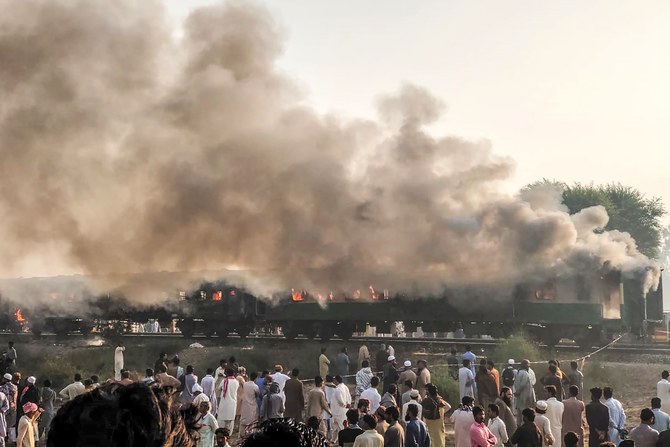
- The train which was traveling from Karachi to Rawalpindi was carrying 857 passengers
- PM Khan ordered an urgent investigation into the incident
Pakistan suffered more from Afghan ‘imbroglio’ than wars with India — special envoy to Kabul
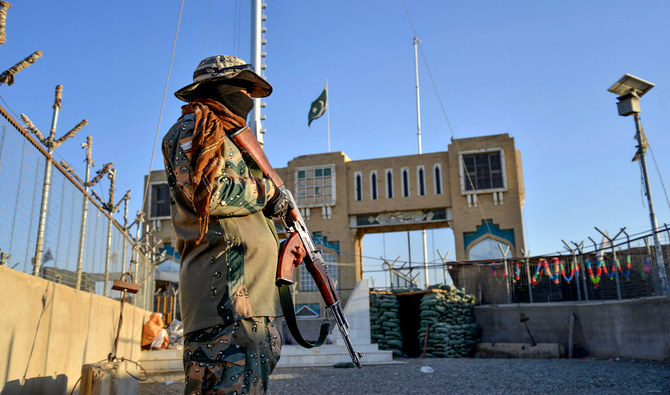
- Ambassador Durrani hopes Pakistan will overcome security threats from Afghanistan through diplomacy
- He warns of growing hostilities in the Middle East, saying the Iran-Israel conflict can engulf the region
ISLAMABAD: Pakistan’s Special Representative for Afghanistan Ambassador Asif Durrani acknowledged that his country had suffered a great deal more due to the volatility in its northwestern neighborhood than its recurrent wars in the east with nuclear-armed India while addressing a conference on Wednesday.
Durrani issued the statement during a penal discussion at the Institute of Strategic Studies Islamabad while sharing a broad overview of his country’s threat perception. Pakistan blamed the administration in Kabul last year in November for not doing enough to address its security concerns by clamping down on militants operating from Afghanistan.
It even maintained there was enough evidence that Afghan authorities were “facilitating” attacks launched by the Tehreek-e-Taliban Pakistan (TTP) against its people and security forces. Subsequently, Pakistan started deporting “illegal immigrants,” mostly Afghans, from its cities while citing security reasons.
“Afghanistan has become a permanent fixture in Pakistan’s regional paradigm for over four decades,” Durrani told the gathering. “In terms of blood and treasure, Pakistan has suffered more due to the Afghan imbroglio than its three wars with India.”
“Over 80,000 Pakistanis have died in the past two decades during the so-called war on terror,” he continued. “The country is still counting its dead and injured. After the withdrawal of the NATO forces, it was hoped that peace in Afghanistan would bring peace in the region. However, such expectations were short-lived.”
Durrani maintained that TTP attacked had increased by 65 percent after the departure of international forces while suicide bombings had shot up by 500 percent.
“The TTP’s enhanced attacks on Pakistan while using Afghan soil have been a serious concern for Pakistan,” he said. “Another worrying aspect is the participation of Afghan nationals in these attacks.”
He hoped that his country would overcome threats emerging from Afghanistan through diplomatic means, though he warned of the rising tensions in the Middle East while pointing out that the Iran-Israel conflict, if not contained, could engulf the whole region.
“Pakistan will also suffer,” he added.
Durrani said the estimated economic cost suffered by his country since the US-led “war on terror” was somewhere around $150 billion.
Pakistan doubles down on completing Iran gas pipeline despite threat of sanctions
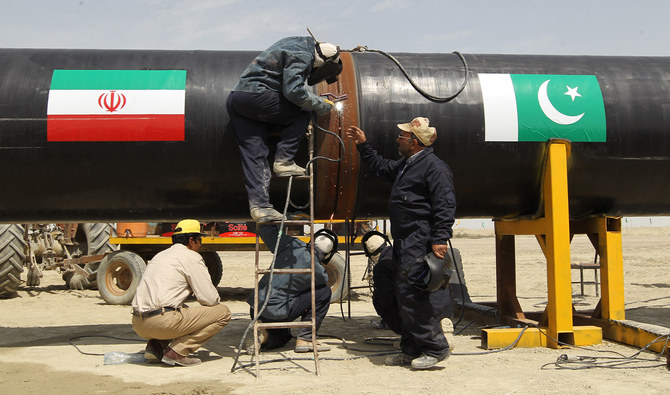
- Major gas pipeline deal has faced delays due to geopolitical issues and international sanctions
- On Wednesday, US warned that countries doing business with Iran faced the “potential risk of sanctions”
ISLAMABAD: Defense Minister Khawaja Asif said on Thursday Pakistan would find a way to complete a major gas pipeline deal with Iran which has faced delays for years due to geopolitical issues and international sanctions.
During a visit by Iranian President Ebrahim Raisi to Pakistan this week, the two nations reiterated the importance of cooperation in the energy domain, including trade in electricity, power transmission lines and the IP Gas Pipeline Project, a joint statement released following the culmination of the visit said.
“We will find a way to complete it,” Asif told reporters when asked if Pakistani officials had discussed the stalled pipeline with Raisi.
In March, Islamabad said it would seek a US sanctions waiver for the pipeline. However, later that week, the US said publicly it did not support the project and cautioned about the risk of sanctions in doing business with Tehran.
On Wednesday, the United States once again warned that countries doing business with Iran faced the “potential risk of sanctions.”
“Just let me say broadly, we advise anyone considering business deals with Iran to be aware of the potential risk of sanctions,” a State Department spokesperson said when asked about the Iranian president’s Pakistan visit and agreements signed. “But ultimately, the government of Pakistan can speak to their own foreign policy pursuits.”
The pipeline deal, signed in 2010, envisaged the supply of 750 million to a billion cubic feet per day of natural gas for 25 years from Iran’s South Pars gas field to Pakistan to meet Pakistan’s rising energy needs. The pipeline was to stretch over 1,900 kilometers (1,180 miles) — 1,150 km within Iran and 781 km within Pakistan.
Tehran says it has already invested $2 billion to construct the pipeline on its side of the border, making it ready to export. Pakistan, however, did not begin construction and shortly after the deal said the project was off the table for the time being, citing international sanctions on Iran as the reason.
Iran’s oil minister at the time responded by saying that Iran carried out its commitments and expects Pakistan to honor its own, adding that Pakistan needs to pick up the pace of work.
In 2014, Pakistan asked for a 10-year extension to build the pipeline, which expires in September this year. Iran can take Pakistan to international court and fine the country. Local media reported that Pakistan can be fined up to $18 billion for not holding up its half of the agreement.
Faced with a potential fine, Pakistan’s caretaker administration earlier this year gave the go ahead in principle to commence plans to build an 80 km segment of the pipeline. In March, Pakistan announced it would seek a sanctions’ waiver.
Washington’s support is crucial for Pakistan as the country looks to sign a new longer term bailout program with the International Monetary Fund (IMF) in coming weeks.
Pakistan, whose domestic and industrial users rely on natural gas for heating and energy needs, is in dire need for cheap gas with its own reserves dwindling fast and LNG deals making supplies expensive amidst already high inflation.
Iran has the world’s second-largest gas reserves after Russia, according to BP’s Statistical Review of World Energy, but sanctions by the West, political turmoil and construction delays have slowed its development as an exporter.
Originally, the deal also involved extending the pipeline to India, but Delhi later dropped out of the project.
With inputs from Reuters
Pakistan refiners, fuel station owners oppose price deregulation, fear business closures
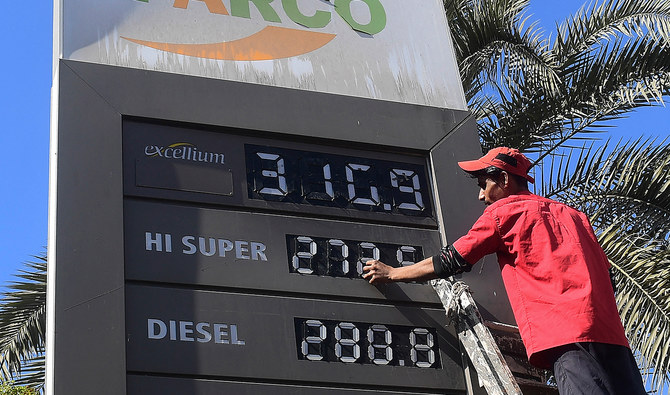
- Petroleum dealers say government wants to avoid public criticism and shift the burden of high oil prices to consumers
- Oil refineries also opposed deregulation earlier this week, saying it would put their $6 billion investment at risk
KARACHI: After Pakistan’s oil refineries, petroleum dealers announced their decision to oppose the deregulation of fuel prices in the country on Thursday, saying the move would adversely impact their businesses and lead to their closure.
The Oil and Gas Regulatory Authority (OGRA) of Pakistan briefed the energy ministry on the possible deregulation of petroleum products on April 17, prompting five of the country’s oil refineries to write a letter in which they described it as complex and critical issue.
The deregulation proposal would empower oil marketing companies to determine fuel prices on the basis of various market forces. Local consumers getting petrol and diesel from places closer to ports and refineries would get relatively cheaper products due to the transportation cost.
“The deregulation is the death warrant for the people and the petroleum industry in the country,” Abdul Sami Khan, Chairman of Pakistan Petroleum Association, said at a media briefing along with other dealers at the Karachi Press Club. “If this is imposed on us, we will be compelled to shut down our businesses.”
The dealers present at the briefing said the deregulation would cause an increase in the prices of petroleum products and make it difficult to maintain the quality of the fuel.
They said giving mandate to oil marketing companies to determine oil prices would be unwise and lead to different market rates.
“The government wants to shift the burden of price hike to people and get rid of the public criticism amid spiraling rates of petroleum products,” Khan added.
He said the smuggled Iranian oil had been openly sold in Pakistan, though it was not refined and damaged engines of vehicles.
He also asked the government to legalize it “in the larger public interest.”
“An agreement should be made to import crude oil from Iran to end smuggling,” Khan suggested. “The crude oil bought from Iran can be refined locally.”
Malik Khuda Buksh, senior leader and founding member of the association, said the deregulation would “create chaos in the market” since everyone would be quoting their own prices.
“Under the current mechanism, the government fixes the prices and no one can charge a single paisa more,” he explained while speaking to Arab News after the news briefing. “When the deregulation takes place, every oil marketing company will give its own price like vegetable and other product sellers, which will lead to further inflation.”
Like refiners, the petroleum dealers also warned that the deregulation of petroleum prices in Pakistan would negatively impact their business.
The letter jointly written by Attock Refinery Limited, Cnergyico PK Limited, National Refinery Limited, Pakistan Refinery Limited and Pak Arab Refinery Limited said the deregulation could jeopardize nearly $6 billion of investment.
The letter maintained it was better to spend money on upgrading the refineries since it would not only result in cleaner and environment-friendly fuels of Euro-V specifications but would also help save precious foreign exchange by substantially increasing local production.
Pakistan women’s great Bismah Maroof retires from international cricket

- Maroof, an allrounder, batted left-handed and scored 6,262 runs including 33 half-centuries
- Maroof captained Pakistan in 96 internationals, including at fourth World Cup in 2022
LAHORE: Former Pakistan women’s captain Bismah Maroof retired from international cricket on Thursday after 276 games in an 18-year career.
“I have decided to retire from the game I love the most,” the 32-year-old Maroof said in a statement on Thursday. “It has been an incredible journey, filled with challenges, victories, and unforgettable memories.”
Maroof, an allrounder, batted left-handed and scored 6,262 runs including 33 half-centuries — three ODI scores in the 90s — and bowled right arm leg break and bagged 80 wickets.
She was 15 when she debuted for Pakistan in 2006 in a one-day international against India, and three years later played her first Twenty20 against Ireland.
Maroof took a break in 2021 to give birth to her first child and said she was grateful for a parental policy that extended her career.
“The support from the PCB has been invaluable, particularly in implementing the first ever parental policy for me, which enabled me to represent my country at the highest level while being a mother,” Maroof said.
Maroof captained Pakistan in 96 internationals, including at her fourth Women’s World Cup in 2022 in New Zealand.
PM, president vow to end malaria, leading cause of illness and death in Pakistan
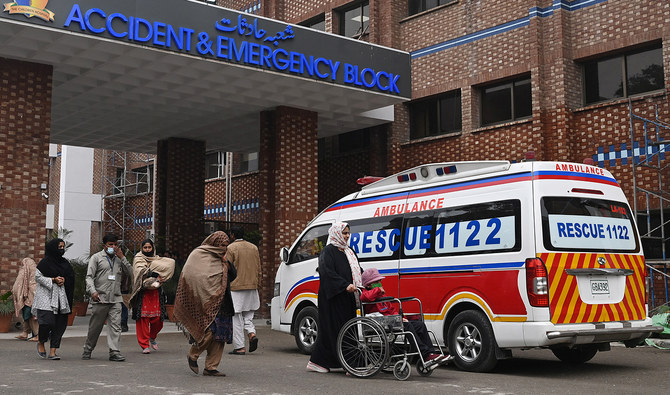
- Over 3.4 million suspected cases of malaria reported in Pakistan between Jan-Aug 2022
- Rapid upsurge observed in Balochistan and Sindh provinces after devastating floods in June 2022
ISLAMABAD: Pakistani top leaders on Thursday called on the government, international partners and organizations, health care professionals, and individuals to unite in their efforts to end malaria, one of the leading causes of illness and death in Pakistan according to the World Health Organization.
The Pakistani prime minister and president sent out the message on World Malaria Day, commemorated on April 25 each year to highlight the need for continued investment and sustained political commitment for malaria prevention and control. The day was instituted by WHO Member States during the World Health Assembly of 2007.
According to WHO data, from January through August 2022, more than 3.4 million suspected cases of malaria were reported in Pakistan compared with the 2.6 million suspected cases reported in 2021. Over 170 000 cases were laboratory confirmed.
A rapid upsurge in cases was observed in Balochistan and Sindh provinces after devastating floods in mid-June 2022, together accounting for 78 percent of all confirmed cases. The risk was assessed by the WHO as very high considering the effect of the flood crisis on the capacity of the national health system.
“In his message on the occasion of World Malaria Day, PM emphasized collaborative efforts to strengthen health care systems, increase access to quality diagnosis and treatment, and raise awareness about the importance of prevention and control measures of malaria,” state-run Radio Pakistan said, reporting on Prime Minister Shehbaz Sharif’s message.
The PM called on research and academic institutions “to flag scientific advances to both experts and the general public, international partners, companies and foundations to showcase their efforts and reflect on how to further scale up malaria control interventions.”
He said Pakistan had significantly enhanced free malaria testing and treatment facilities in malaria-endemic districts across the country through collaboration between the health ministry, national and international partners, provincial counterparts, NGOs and private stakeholders.
In a separate message, President Asif Ali Zardari emphasized collective efforts to curb malaria and expressed concerns over the rise in malaria cases due to the 2022 floods.
“Zardari called upon the provincial governments and other stakeholders to unite to deal with this alarming situation. He also called for raising awareness about the disease,” Radio Pakistan said.
Pakistan was hit by devastating floods in June 2022 which resulted in over 33 million people being affected, 81 districts being declared as calamity-hit and the national health infrastructure being badly impacted.
An upsurge in reported malaria cases was observed after the floods. In Sindh province, confirmed malaria cases in August 2022 reached 69,123 compared to 19,826 cases reported in August 2021. In Balochistan province, 41,368 confirmed cases were reported in August 2022 compared to 22,032 confirmed cases in August 2021. These two provinces together accounted for 78 percent of all reported confirmed cases in Pakistan in 2022.
Reports from 62 high-burden districts indicated that additional 210,715 cases were reported in September 2022, compared to 178,657 cases reported in the same districts in August 2022.










